A major international investigation has found compelling evidence that several of the US’s key European allies in the war against so-called Islamic State routinely deny civilian harm from their own actions – even where specialist US military personnel within the international Coalition have assessed such cases to be credible.
Three European countries are implicated – the United Kingdom, France and Belgium – a lengthy investigation by the BBC, Libération, De Morgen and RTL Netherlands has found.
BBC News: US military says strikes may have killed civilians
Libération: Syrie-Irak : ces frappes meurtrières que les Etats refusent de reconnaître
De Morgen: De veertig burgerslachtoffers die niemand erkent, ook België niet
A total of eleven specific civilian harm events have so far been identified – involving the officially confirmed deaths of at least 40 Iraqi and Syrian civilians during 2017 and 2018. No European ally will admit to the fatalities.
“Cases like this expose a fundamental gap in accountability created by multinational coalitions,” notes Dan Mahanty of the US advocacy organisation CIVIC. “If warring parties simply collude to hide their actions, they can also evade their responsibilities. For civilians who lost loved ones or had their livelihoods destroyed, it means losing any hope of remedy, or even basic acknowledgement of their loss. It’s a pretty significant affront to their dignity.”
US admissions
The problem incidents came to light after the US Defense Department was legally required to report to Congress in May 2019, on all recent confirmed civilian deaths from US military actions. That Pentagon report declared 170 incidents for Iraq and Syria during 2017; and a further 13 events during 2018.
However, when Airwars then crossmatched the 183 declared US civilian harm events against those cases the anti-ISIS Coalition had officially conceded during the same period, it identified 14 further incidents which had been omitted. Several senior US defense officials independently confirmed to Airwars that all credible non-US civilian harm events had been explicitly excluded from the list given by DoD to Congress.
Three of these ‘missing’ events were previously confirmed Australian civilian harm cases. That left eleven civilian harm incidents which had not publicly been admitted by any US ally – for example the deaths of three civilians on May 28th 2017 including Hayat, the wife of Mustafa al-Saguri, who died alongside her young daughter and a third unknown civilian at al Hammam in Raqqa province.
The US-led Coalition had admitted those deaths in April 2019, noting that “Regrettably, the strike on an associated target building unintentionally resulted in the deaths of three civilians.” But which US ally was responsible?
During 2017 and 2018, five partners were still active alongside the US in the war against ISIS: the UK, France, the Netherlands, Belgium and Australia. With the al Hammam incident not included in the Pentagon’s report of US-caused civilian harm events to Congress, Airwars then crossmatched this and ten other unclaimed incidents, against published strike reports by the US’s allies for the dates in question.
In June 2019, Airwars wrote to each nation’s military, requesting confirmation of whether its forces had been responsible or not for specific confirmed civilian harm events.
Australia quickly responded that it had not conducted either of the incidents it had potentially been flagged in, noting definitively that “Australian aircraft did not conduct either of the strikes on 9 January 2017 and 15 May 2017.” Nine months later, the Dutch ministry of defence finally confirmed that it was not responsible for those deadly strikes it had in theory been linked to.
With indirect confirmation that the eleven officially confirmed civilian harm events had been the responsibility of three European militaries, Airwars then approached major news organisations with which it had engaged previously on civilian harm issues. The BBC, Libération, RTL Netherlands and De Morgen each then pursued its own national investigation, with an agreed joint embargo.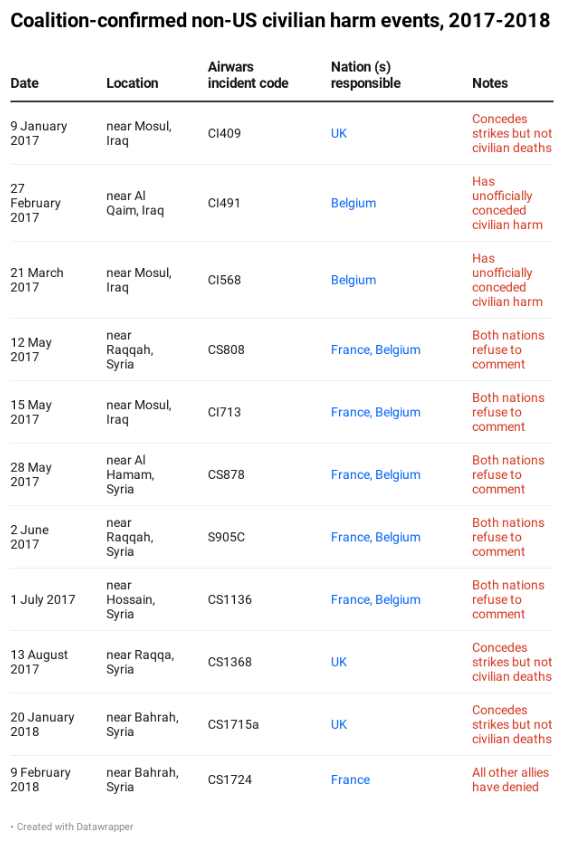
Britain: admits strikes but denies civilian deaths
The most comprehensive admission during the investigation came from the UK’s Ministry of Defence (MoD), which is among the more transparent members of the US-led Coalition.
Of the six potential UK events flagged to it by Airwars, the MoD confirmed by letter that it had been responsible for three of the strikes which the Coalition assessed had killed at least 15 civilians. However, the UK then refuted the US-led Coalition’s findings, insisting that no civilians had in fact died.
The first event took place at Mosul, Iraq on January 9th 2017, and had already sparked a BBC investigation after a military whistleblower within the Coalition had reported civilian deaths from an RAF strike. The Ministry of Defence had over-ruled that view, determining that no civilians had been harmed.
Following the BBC’s investigation, US military personnel at the Coalition had themselves then assessed the event – determining it to be Credible in March 2018 and noting that “two civilians were unintentionally killed.” In a detailed letter to Airwars, the MoD justified its own continuing refusal to accept civilian deaths:
We looked at this incident very closely indeed. It happened in an area of active fighting between Daesh and the Iraqi security forces, and neither the troops on the ground nor the coalition aircraft detected any signs of a civilian presence in the area either before or after the truck-bomb was destroyed. The group of men, by their movements and behaviour, showed every sign of being Daesh fighters – particularly the presence of a motorcyclist, frequently used by the terrorists to scout ahead during the street fighting…. We therefore concluded that, if the group did indeed sustain casualties, they were extremely likely to have been Daesh terrorists; we have no reason to believe, on the evidence available, that they were civilians.
The second RAF strike took place at Raqqa, Syria on August 13th 2017. According to the US-led Coalition, 12 civilians died after “Coalition aircraft engaged ISIS fighters utilizing a mortar system in a building used as a defensive fighting position.” Among the victims locally named that day were Walid Awad Al Qus and his young daughter Limar.
The Coalition’s admission of 12 deaths in this event represented one of the highest confirmed tallies for the entire battle of Raqqa, which an Amnesty International/ Airwars investigation later concluded had seen at least 1,600 civilians killed by Coalition actions.
Once again accepting the strike but denying the civilian deaths, the MoD asserted: “A single individual was seen on weapons system video moving in the area just prior to the impact of one of our weapons. There is no evidence that this individual was a civilian, as opposed to one of the Daesh fighters engaged with the [SDF]. We have certainly not seen any evidence that twelve civilian casualties were caused.”
In the final event, an RAF drone strike on January 20th 2018 killed one civilian nearby, according to an internal assessment by the US-led Coalition. Once again, the British reached a different conclusion. “Careful analysis was conducted of the available footage and of all available reports from the area. These showed that there was no evidence of civilians being present in the location, and the footage identified a weapon being carried by the likely casualty. It was therefore concluded that said individual was very likely a Daesh extremist and not a civilian.”
Senior defence officials confirmed to both the BBC and to Airwars that the UK presently requires what it calls ‘hard facts’ when assessing civilian harm claims – an apparently higher standard even than the ‘beyond reasonable doubt’ used by UK courts. Civilian casualty assessors within the US military instead use a ‘balance of probabilities’ approach, Airwars understands – allowing them to consider local credible reports of civilian harm in their own investigations.
In effect, the UK has set the burden of proof so high that it is almost impossible for the MoD to reach a determination of civilian casualties – even when its most powerful ally the US concludes the exact opposite, critics say.
Chris Cole of the advocacy group Drone Wars UK accused the Ministry of Defence of overly focusing on managing public perceptions of war, rather than looking at appropriate levels of transparency: “We end up with obfuscation, secrecy and – as these revelations show – a kind of internal structural self-denial, where it has become seemingly impossible for the MoD even to accept that civilian casualties have occurred.”
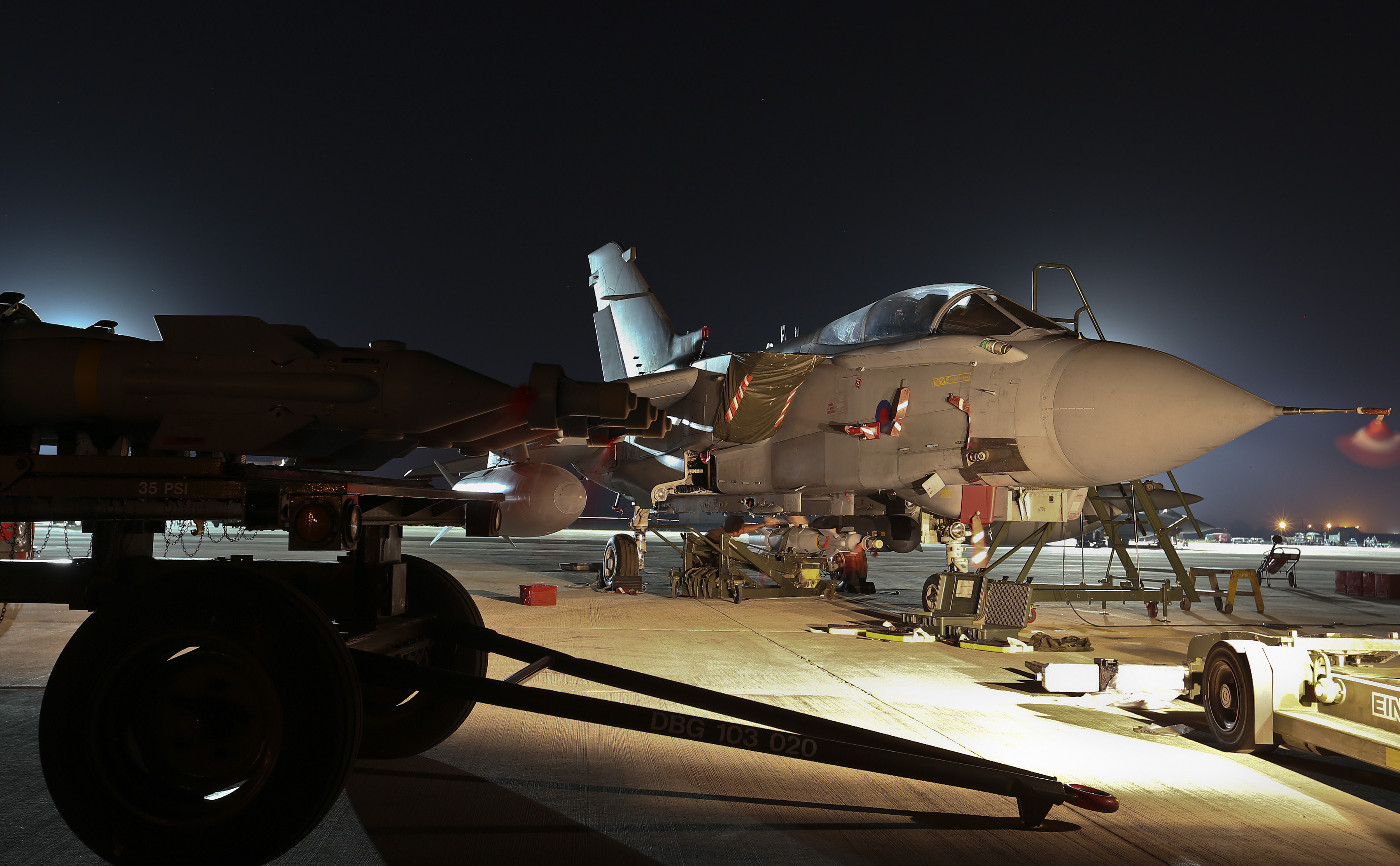
Library image: Missiles being loaded onto an RAF Tornado prior to a mission against Daesh (via Ministry of Defence)
Belgium: “Certainly not involved in all events”
Belgium, which ended its involvement in the war against ISIS in late 2017, was potentially implicated in at least nine incidents which the US-led Coalition had deemed credible, an initial review concluded. While two of the strikes were later admitted by the UK, at least 23 civilians had died in the other seven events in which Belgium was implicated, according to US officials.
Several of these incidents were already known. In May 2017, a senior Belgian official had briefed Airwars that the Government was planning to admit two civilian harm events in Iraq earlier that year – one at al Qaim on February 27th, and a second event on March 21st near Mosul. Between them, the US-led Coalition had itself concluded, the strikes had killed at least two civilians and injured four others.
However Belgium then failed not only to declare its role in the strikes, but also publicly denied any civilian harm – which led in turn to a front page news story in De Morgen at the time.
Asked in June 2019 to say whether its aircraft were responsible for officially declared civilian harm in up to nine incidents, the Belgian Ministry of Defence told Airwars by email: “For the year 2017, BAF [Belgian Armed Forces] was certainly not involved in all events. With regard to the other data given, BAF was no longer present in theatre. BAF completed its role at the end of 2017. Our conclusion is that all ROEs [rules of engagement] were respected as confirmed by our federal court.”
That comment by Belgium – that it “was certainly not involved in all events”, appears to be tacit confirmation that their aircraft were involved in confirmed civilian harm events. However it remains unclear whether the Ministry accepts the Coalition’s own findings in any Credible case.
In its own investigation, De Morgen features Muhammad Sheikh Sa’ab, whose leg was amputated following a likely Belgian or French airstrike on May 12th-13th 2017. He was one of the lucky ones. The US-led Coalition acknowledges at least 10 deaths, while locals insist more people died. Survivors and relatives may never know which military was responsible.
“Belgium and other Coalition countries cannot bomb and then simply decide to look away from the deadly consequences. If there is proof of civilian casualties, the Belgian government needs to take responsibility,” argues Willem Staes of the Belgian advocacy organisation 11.11.11. “Mature democracies need to ensure both transparency and accountability, and provide civilian victims with adequate compensation and restitution.”
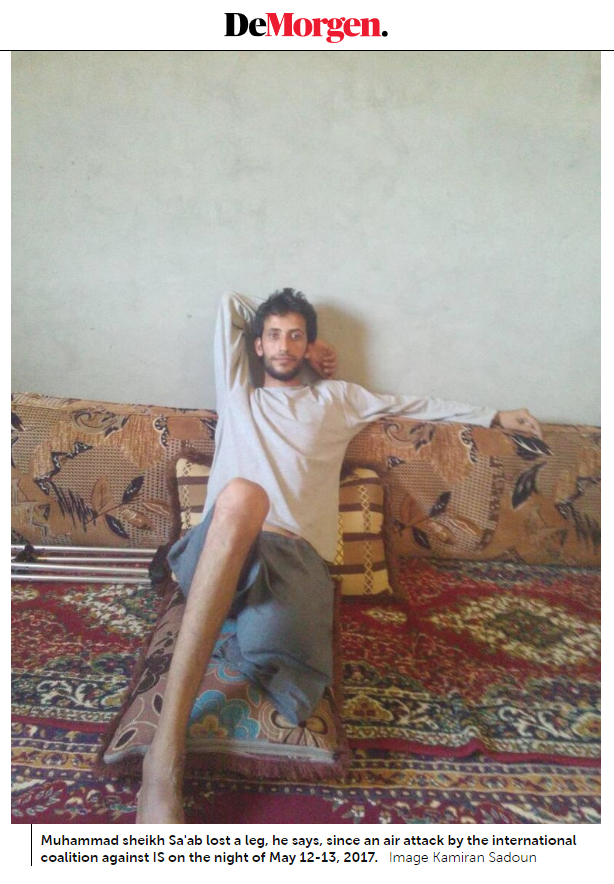
De Morgen interviewed the survivor of a probable Belgian or French airstrike which in 2017 killed at least 10 civilians, according to the US-led Coalition.
The Netherlands: Last minute transparency
When the Dutch government admitted in November 2019 that its aircraft had been responsible for the deaths of approximately 70 civilians in Hawijah, Iraq almost five years earlier – a fact which had been hidden from both Parliament and the Dutch people – defence minister Ank Bijleveld promised new transparency standards. Yet for much of this investigation, it seemed little had changed.
In June 2019, Dutch defence officials were informed of two Coalition-confirmed civilian harm events in which their aircraft were potentially involved.
While one of those events was later confirmed to be a British strike, a second at al Bahrah, Syria on February 9th 2018 still implicated both the Dutch and French militaries. “One civilian was unintentionally killed as a motorcycle entered the impact area moments before the strike,” US military investigators had concluded in August of that year.
In late January 2020, Dutch officials verbally informed Airwars that they would be neither confirming nor denying their involvement in the two Coalition-confirmed civilian harm events.
However, in a last minute turnaround, on March 13th defence officials informed Airwars and RTL Netherlands that they had not, in fact, been involved in either of the incidents, stating that “In the interests of increased transparency, we can now explicitly answer your question about these air raids. As far as the Ministry of Defense is aware, these attacks did not involve Dutch forces.” It was also indicated that from now on, the Netherlands planned to be more transparent in such cases.
“Better late than never, this is a major step in the right direction for Dutch military transparency and accountability. If implemented fully, this should benefit past and future civilian victims seeking information, assistance or compensation and it should benefit parliamentary oversight of Dutch participation in military operations,” says Wilbert van der Zeijden, a team coordinator focused on Protection of Civilians at PAX.
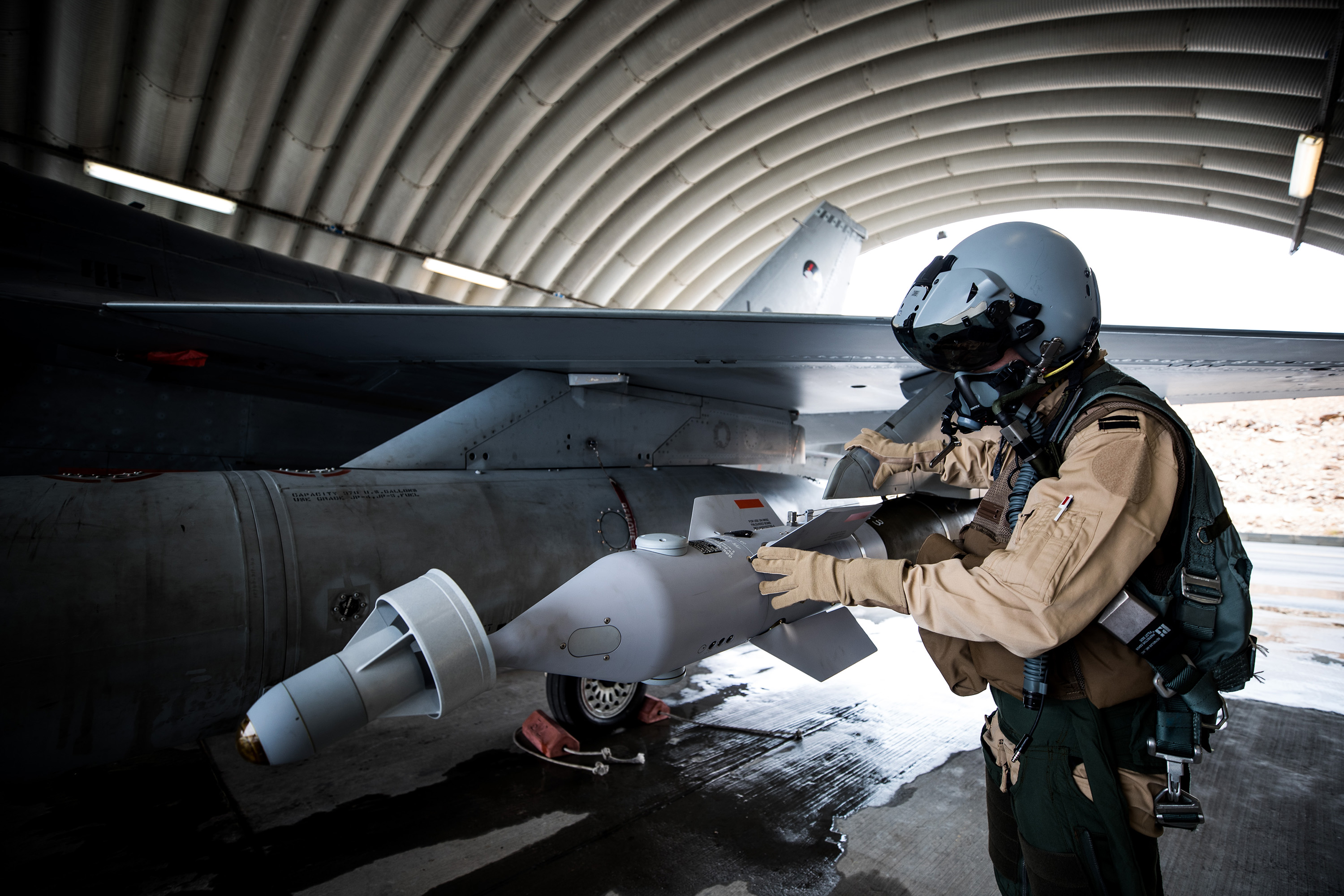
Library image: A Dutch F-16 pilot checking missiles before take-off from an airbase in Jordan (Netherlands Defence Ministry)
France: a refusal to engage
According to an initial review, France was potentially implicated in up to nine Coalition-confirmed civilian harm events during 2017 and 2018. While the UK has since explicitly confirmed its role in several of those strikes, France remains implicated in seven events which between them killed at least 24 civilians.
Despite conducting more air and artillery actions than any Coalition member other than the United States, the French have yet to admit to a single civilian death in their six year war against so-called Islamic State.
That silence continues. After confirming receipt from Airwars in June 2019 of details of possible French civilian casualty events, the defence ministry then ceased communication – refusing to answer all emails ever since.
Marie Forestier, who is part of the Libération team investigating civilian harm from French strikes, previously reported for the newspaper that “200 allegations of civilian casualties potentially involving the French military have been investigated.” Yet details of those investigations remain secret.
Officials do not deny that civilians have been killed by French actions. Even so, they insist that those numbers must remain buried within broader Coalition numbers.
With the United States, the UK and the Netherlands each explicitly denying involvement in a Coalition-confirmed event near al Bahrah village in Syria on February 9th 2018, only France now appears liable. Yet Ministry officials are still refusing to confirm or deny their involvement in the confirmed death of a civilian that day, according to Libération.
“The French Ministry of Defense has refused to answer direct questions and followup questions. As there is a total lack of interest from MPs, media, and public opinion in France, the Army remains unchallenged and is not encouraged to reveal more information. As a result, there is no scrutiny on French airstrikes and no accountability” asserts reporter Marie Forestier, who has been examining French accountability for civilian harm for several years.
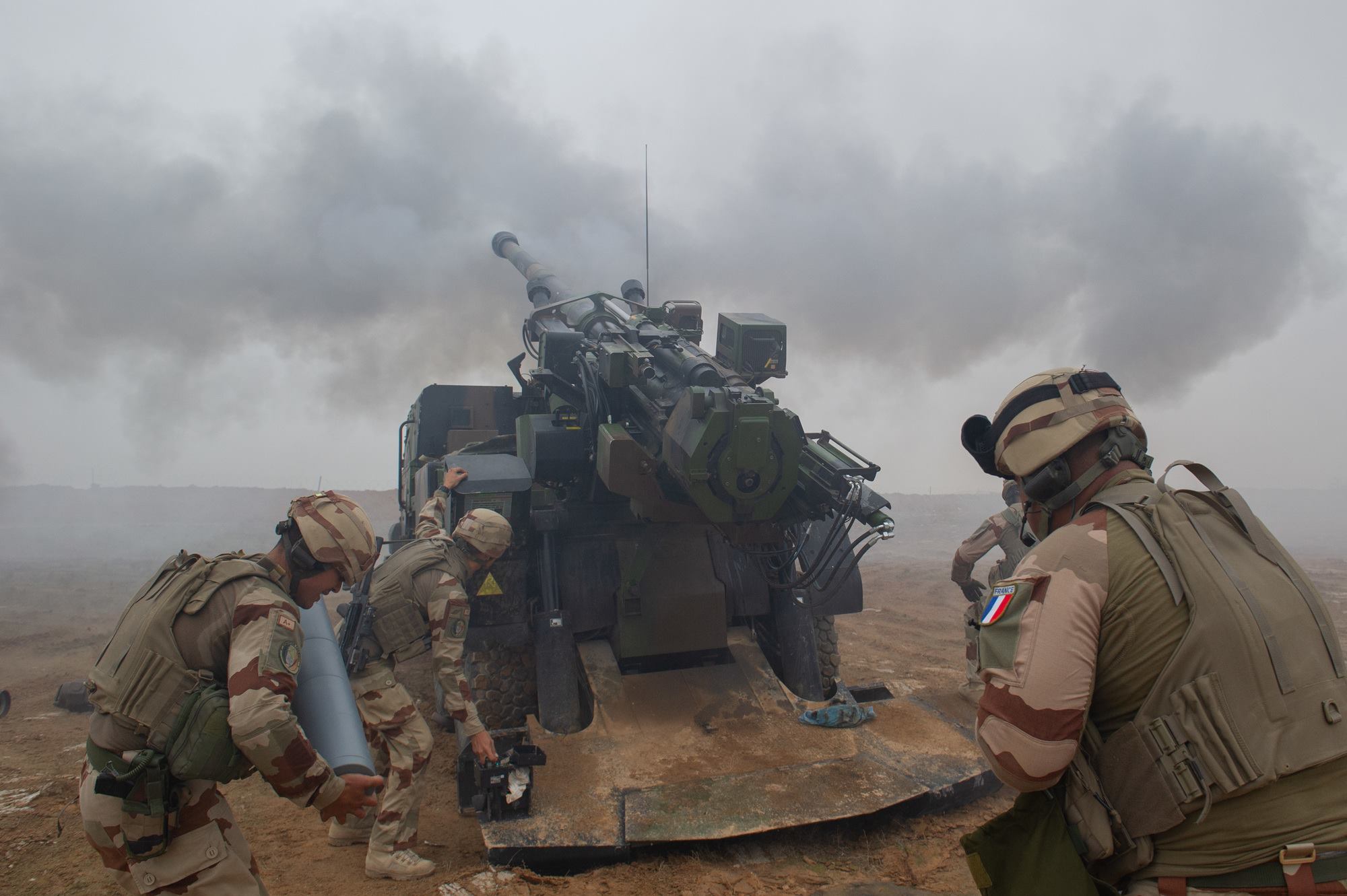
Library: French artillery crews in action against ISIS in May 2019 (Image via Armee francaise)
Widening gulf between US and Europe
Airwars is calling for a major review by European powers of their approach to civilian harm assessments – where the US now leads on best practice.
“US military officials are certainly no pushover when it comes to determining civilian harm. Around nine out of ten claimed civilian casualty events assessed by the Coalition since 2014 have been rejected, our analysis shows,” says Dmytro Chupryna, deputy director of Airwars.
“Even so, this investigation reveals a complete unwillingness by most European allies to admit civilian harm from their own strikes – even where US military personnel determine otherwise. Europe’s civilian casualty assessment processes are presently unfit for purpose.”
On May 12th 2017, during the fierce battle for Raqqa, at least 10 and as many as 20 civilians died when Coalition aircraft attacked Asadiya farm, to the north of the city. According to local reports the dead included Khalil Dhammaage; Hassan Ismail Al Zeyabage; Muhammad Al-Nasehage; and Abu Baraa and his entire family.
Three months later, Coalition military officials concluded that “During a strike on ISIS fighters, it was assessed that 10 civilians were unintentionally killed in a building adjacent to the target.” Yet to this day, neither Belgium nor France will say whether their aircraft killed those ten or more civilians. Remaining families have no chance of an explanation, an apology, or compensation.
According to Dan Mahanty of CIVIC, “the record now clearly shows that a public accounting of civilian harm carries few risks and more than a few benefits for belligerents. It’s a shame that the overall record of transparency and accountability for the US-led Coalition is rendered less meaningful because a few governments prefer to hide in the crowd.”
In six weeks, the Pentagon is due by law to make its latest disclosure to Congress on civilian harm claims from US actions, covering a period in which at least 44 additional civilian harm events have been confirmed by the Coalition in Iraq and Syria. How many of these will again emerge as non-US events remains to be seen.







